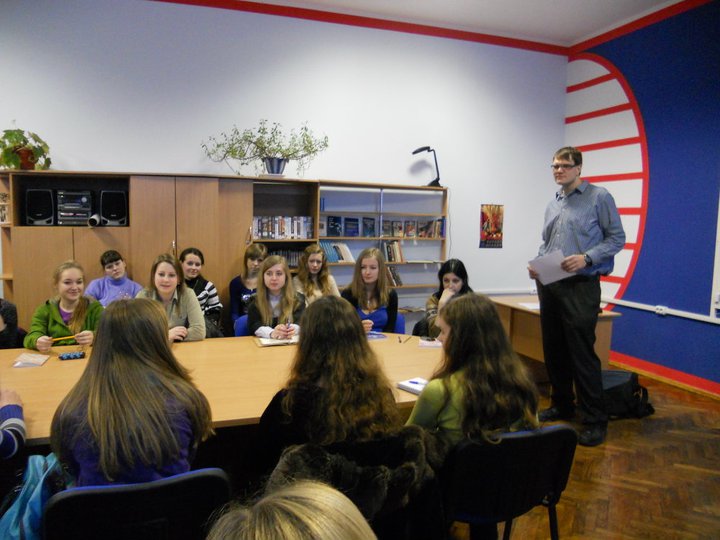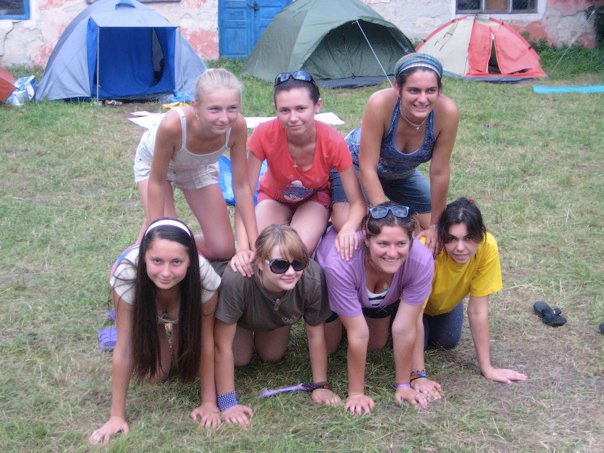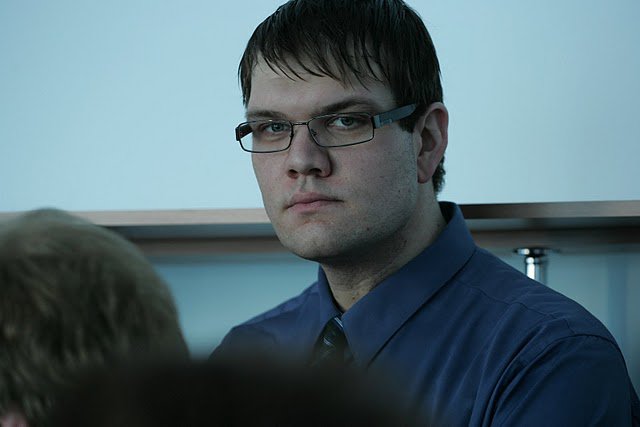Andy Cartwright left Wabash in 2005, and like so many of the College’s alumni he wasn’t sure where life might take him. The former football player and Bachelor writer worked for a year, before enrolling at IU-Bloomington, from which he earned a master’s degree in American literature.

He thought about entering a Ph.D. program, but changed his mind and signed on with the Peace Corps and left the country. The entire focus of his life changed the moment he got to Ukraine. He worked in the Teaching English as a Foreign Language (TEFL) program.
“In grad school, I found that I was mostly living for myself, mostly doing work that seemed pointless from a real-life, total-world perspective, and I was incredibly unhappy,” said the English major. "When I joined Peace Corps, I wanted nothing more than to get involved in activities and projects that really made a difference and really changed lives. I know that's a stereotypical ‘save the world’ Peace Corps volunteer answer, but it's the only way I can say that I want to be elbow deep in projects that involve and help real people.”
While his Peace Corps work keeps him busy at Rivne State Humanities University, he directs his passion to people — particularly kids — suffering from HIV/AIDS.
“The HIV infection rate over here hovers around an alarming 2 percent — obviously that's not as high as the upward 25 percent in some African nations, but it is still the highest in all of Europe and Central Asia,” explained Cartwright. “HIV/AIDS is certainly one of the most pressing, up-and-coming health concerns for this country.”

Cartwright has been accepted as a counselor at two HIV/AIDS summer camps in the Ukraine for the summer — and both are in need of funding. The camps attack the issue from both fronts: Camp HEAL works through education and prevention and Camp OHALOW seeks to improve the lives of HIV affected children — allowing them to “be real kids for at least one week, while seeking to equip them with longer-term skills and knowledge.”
Cartwright is personally invested in Camp OHALOW (Overcoming HIV/AIDS and Leading Our World), which is a weeklong leadership camp for 30 HIV-positive children ages 10 to 13 in Ukraine.
“The camp will give the kids the opportunity to experience traditional summer camp — to play games, sing songs, do arts and crafts, and simply live a normal life for a week,” Cartwright said. “And, sheltered from the stigma and discrimination that characterizes the life of an HIV-positive individual in Ukraine, they will be able to speak about HIV in a safe, supportive, non-judgmental environment.”
Additionally, Camp OHALOW will give kids the opportunity to learn more about managing their lives with HIV/AIDS. A doctor, nurse, and psychologist will answer questions and run sessions on the biological basics of HIV/AIDS, stigma and discrimination, sexual health, and nutrition. “Ultimately, the goal is to instill in these children the confidence and leadership skills necessary to leave camp and continue a meaningful life through which they can contribute something positive to their villages.”
While Ukraine is making steps toward increasing awareness to prevent further transmission, the actual HIV-positive population is tucked away, ignored, and forgotten, Cartwright said. “Few social services exist for HIV-positive people, and specialized programming for HIV-positive children is virtually non-existent. This is the need that Camp OHALOW was created to meet.”

Cartwright has been on the “ground floor” of the development of OHALOW, and is one of seven Peace Corps volunteers creating the program.
“I see OHALOW as a project that doesn't merely ‘educate’ or ‘raise awareness’ about HIV/AIDS which are good and noble goals in themselves, but one that seeks to better the lives of people who are actually affected by the disease, who are living with it, surviving with it, and hopefully, flourishing with it,” he said.
Cartwright will also serve as a counselor at Camp HEAL (Human Trafficking, Education, AIDS/HIV, Leadership), which focuses on education and raising awareness in stopping the spread of HIV/AIDS in this country. “At HEAL, we will give a select group of young people the information they need to protect themselves against the disease, and equip them to return to their hometowns to work with their peers in spreading this information even further,” Cartwright said. “The camp really speaks to my heart as an educator!”
Cartwright has clearly discovered his passion — helping save the lives of young people, who often lead “closeted” HIV-positive lives. But raising the funds to make the camps successful has proved to be an arduous task. Having contacted every member of his extended family “and friends that I’ve known since middle school,” Cartwright hopes that Wabash alumni, faculty, staff, and students who share his passion to step up.
To get OHALOW off the ground, Cartwright and the other founders need donations of nearly $7000. Camp Heal is almost $9000 short of its fund-raising goal.
“These are intimidating numbers, I know, but money goes a long way in this country,” Cartwright explained. “At OHALOW, for example, it costs only $14.15 to send a kid to camp for a day; $36 will cover the camp doctor’s salary; the cost of a typical program is only $10; and it takes just $99 to send a kid to camp for the whole week.”
"I don't have any experience working with HIV-positive people first-hand, though so many live normal lives without anyone around them knowing about their condition," Cartwright added. "I am interested in this 'closeting' of the disease, and stigma/discrimination is one of my main personal and academic interests; it appears constantly in my personal writing, and I definitely have a heart and passion for any group that experiences stigma and stereotyping. "
 He thought about entering a Ph.D. program, but changed his mind and signed on with the Peace Corps and left the country. The entire focus of his life changed the moment he got to Ukraine. He worked in the Teaching English as a Foreign Language (TEFL) program.
He thought about entering a Ph.D. program, but changed his mind and signed on with the Peace Corps and left the country. The entire focus of his life changed the moment he got to Ukraine. He worked in the Teaching English as a Foreign Language (TEFL) program. Cartwright has been accepted as a counselor at two HIV/AIDS summer camps in the Ukraine for the summer — and both are in need of funding. The camps attack the issue from both fronts: Camp HEAL works through education and prevention and Camp OHALOW seeks to improve the lives of HIV affected children — allowing them to “be real kids for at least one week, while seeking to equip them with longer-term skills and knowledge.”
Cartwright has been accepted as a counselor at two HIV/AIDS summer camps in the Ukraine for the summer — and both are in need of funding. The camps attack the issue from both fronts: Camp HEAL works through education and prevention and Camp OHALOW seeks to improve the lives of HIV affected children — allowing them to “be real kids for at least one week, while seeking to equip them with longer-term skills and knowledge.” Cartwright has been on the “ground floor” of the development of OHALOW, and is one of seven Peace Corps volunteers creating the program.
Cartwright has been on the “ground floor” of the development of OHALOW, and is one of seven Peace Corps volunteers creating the program.